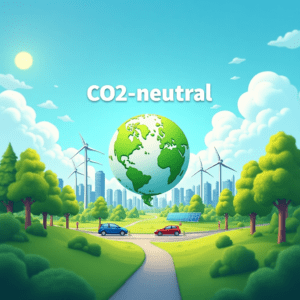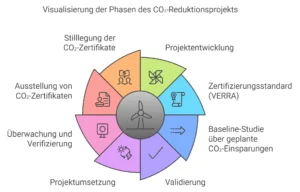The climate crisis describes the current state of the global climate, characterized by rapid and far-reaching changes in temperature, extreme weather events, and ecosystems. This term highlights the urgency caused by accelerated global warming and its severe consequences for both humans and the environment. The climate crisis goes beyond the mere warming of the Earth and encompasses a wide range of ecological, economic, and social problems exacerbated by rising greenhouse gas emissions.
Causes of the Climate Crisis
The climate crisis is primarily driven by human activities such as the burning of fossil fuels (coal, oil, gas), deforestation, industrial agriculture, and increased energy consumption. These activities lead to the emission of greenhouse gases like carbon dioxide (CO₂), methane (CH₄), and nitrous oxide (N₂O), which trap heat radiation in the atmosphere and intensify the so-called greenhouse effect. As a result, global temperatures rise at a rate that is unknown in Earth’s history without human influence.
Effects of the Climate Crisis
The consequences of the climate crisis are diverse and affect both natural and human systems:
1. Extreme Weather Events: The climate crisis leads to an increase in heatwaves, droughts, floods, and storms. These extreme weather events not only become more frequent but also more intense, placing a heavy burden on human infrastructure, agriculture, and health.
2. Melting Glaciers and Rising Sea Levels: Due to the warming of the Earth’s surface, polar ice caps and mountain glaciers are melting. The resulting rise in sea levels threatens coastal regions worldwide and can lead to flooding and land loss. Island nations and low-lying coastal areas are especially at risk.
3. Loss of Biodiversity: The climate crisis disrupts ecosystems and presents challenges to many species that cannot adapt quickly enough. Coral reefs, which are sensitive to rising water temperatures and acidification, are particularly at risk. The extinction of species negatively impacts the entire food chain and ecological balance.
4. Threat to Food and Water Security: Climate changes lead to unpredictable harvests and reduced water availability in many regions, jeopardizing food production and water supply. This can have severe consequences for populations, particularly in regions heavily dependent on agriculture.
5. Health Impacts: The climate crisis also has direct and indirect health consequences. Extreme heat can cause heat strokes and other health problems, while the spread of disease vectors such as mosquitoes into new areas increases the risk of diseases like malaria and dengue fever.
Urgent Action and Solutions
To combat the climate crisis, rapid and decisive action is necessary. This includes:
– Reduction of Greenhouse Gas Emissions: This involves transitioning to renewable energies, improving energy efficiency, protecting



